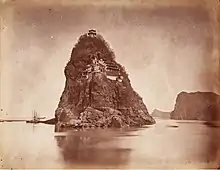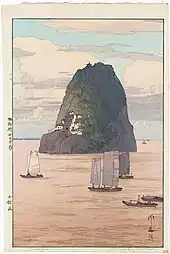Little Orphan
Little Orphan is a rock hill in the middle of the Yangtze River, located on Susong, Anqing, Anhui province in East China. It is a landmark that frequently written and photographed by many Western travelers along the Yangtze in the second half of the 19th century and the first half of the 20th century.[1][2][3] It formed during the quaternary glaciation. The hill is 78 meters above sea level. During the dry season, it would connect with the north bank of the Yangtze and become a peninsula. There is a Buddhist monastery (also a Mazu temple) on the mountainside and a pavilion on the top of the hill. Its name suggests that it stands alone in the river. "Little" makes it different from "Great Orphan" in Poyang Lake.[4][5] It is classified as an AAA-rated tourist attraction by China National Tourism Administration, attracting tens of thousands tourists and pilgrims every year.[6] Little Orphan has been a frequent subject in the Chinese classic literature, and one travels depicting Little Orphan written by Lu You is selected for the textbook of high school.[7] It appears on the 2016 Chinese film Crosscurrent.[8]
| Little Orphan | |||||||
|---|---|---|---|---|---|---|---|
| Simplified Chinese | 小孤山 | ||||||
| Traditional Chinese | 小孤山 | ||||||
| |||||||


References
- "The search results for "Little Orphan yangtze"". Google Books. Retrieved 23 January 2018.
- "Images tagged with "Xiaogushan"(Little Orphan)". Historical Photographs of China. Retrieved 2018-01-23.
- "Yangtze River Views". The China Marine. Retrieved 23 January 2018.
- "朱元璋是小孤山妈祖文化的推手". 宿松新闻网. 2013-08-06. Retrieved 2018-01-23.
- 小姑娘娘的由来. 宿松新闻网. 2011-10-12.
- "徽风皖韵-小孤山". Anhui Government. Retrieved 23 January 2018.
- "过小孤山大孤山(人教版高二选修欣赏课)".
- "爱情电影《长江图》在宿松小孤山取景". 新安传媒网. 2012-02-12. Retrieved 23 January 2018.
External links
 Media related to Little Orphan Island at Wikimedia Commons
Media related to Little Orphan Island at Wikimedia Commons- Official website (in Chinese)
- Photos of Little Orphan in 2014